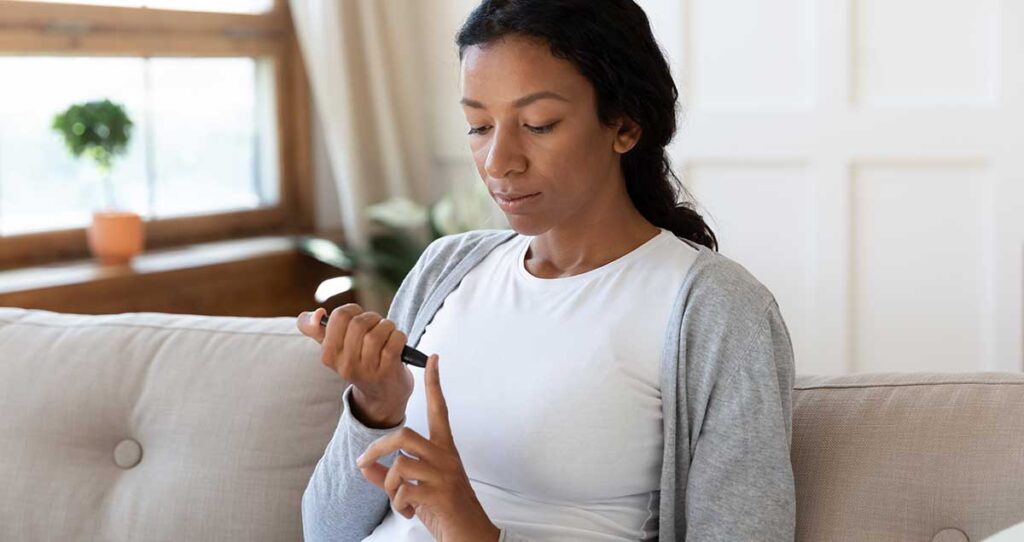COVID-19 is a virus that affects the respiratory system (the system that enables us to breathe). People with diabetes are not more likely than others to catch the COVID-19 virus, but if they do catch it, they are more likely to have a severe form of the infection and to suffer more complications. This makes it particularly important for people with diabetes to do everything they can to protect themselves from this virus. Here are some things you can do to help protect yourself.
• Wash your hands thoroughly and often with soap and water. If soap and water are not available, use an alcohol-based hand sanitizer.
• Avoid touching your eyes, nose, and mouth.
• Regularly clean commonly used surfaces and devices you touch or handle.
• Don’t make unnecessary trips away from home.
• If you do have to leave your home, try to stay at least 2 metres away from anyone else.
• Avoid contact with people who appear to be sick with a respiratory illness.
• Watch carefully to see if you develop any symptoms.
Common symptoms of COVID-19 to watch for include fever, tiredness, dry cough, aches and pains, nasal congestion, runny nose, sore throat, and diarrhea. However, some people who become infected with the virus never develop symptoms. If you do develop any of the symptoms, continue following your diabetes management plan and call your doctor to see whether you should make an appointment to go in for a checkup and for advice on how to treat your symptoms. Research has shown that insulin and other treatments for blood sugar control do not increase the risk of severe COVID-19, and you should continue to take them. In fact, you should not make any changes to your diabetes management plan without checking first with your doctor. It is always better to be prepared than to be surprised by something unexpected. For people with diabetes, this includes having a sick day management plan in place before you get sick.
The article “Sick Day Management” below will help you prepare for COVID-19 or any other illness you may develop.
Sick Day Management
Even a minor illness can cause serious problems for people with diabetes. When we are sick, our body reacts by releasing hormones to fight infection, but this can raise blood glucose (blood sugar) levels and make it more difficult for insulin to lower blood glucose. A little planning can reduce the likelihood of developing dangerously high blood glucose levels if you get sick.
Plan ahead
While you are still healthy, you should talk to your doctor or diabetes care team to create a sick day management plan. Your plan should include your target blood glucose goal during an illness, how often to test your blood glucose and ketone levels, how your diabetes medication schedule or insulin might have to be adjusted, if you should stop taking any other medications, and what warning signs indicate it’s time to contact a doctor. Make sure you keep your sick day management plan where it will be handy when you need it. Prepare a sick day kit that includes:
• glucose tablets to treat hypoglycemia (low blood sugar)
• sugar-free beverages
• a thermometer
• enough blood glucose testing strips
• a ketone meter and strips
Managing your blood sugar
If you are on insulin, continue taking it even if you are vomiting or have trouble eating or drinking. If you are managing your diabetes with medications or if you are taking medicines for other conditions, you may need to stop taking them if you are at risk of becoming dehydrated as a result of vomiting or diarrhea.
Speak with your doctor if you take any of these types of medicines to make sure you know what to do if you get sick:
• blood pressure medications
• diuretics (“water pills”)
• nonsteroidal anti-inflammatory drugs (NSAIDs)
• pain medicines
• sulfonylureas
Be careful about taking over-the-counter medicines. For example, if you have a cough or cold and you are looking for relief from your symptoms, you should be aware that some products contain sugar. Ask your London Drugs pharmacist for assistance in choosing a product that will help you feel better without affecting your blood glucose control.
Stay hydrated

If you are vomiting, have diarrhea, have a fever, or are exposed to excessive heat, you are at risk of dehydration. Be sure to drink plenty of fluids that contain minimal or no sugar. Try to drink at least one cup (250 mL/8 oz.) of sugar-free fluids periodically for a total of at least nine cups (2.2L/72 oz.) daily to prevent dehydration. Good choices of fluids include water, clear soup or broth, herbal tea, and caffeine-free diet pop (such as diet ginger ale). Limit the amount of caffeine-containing beverages you drink (e.g., coffee, some teas, and some types of carbonated soft drinks), because caffeine makes dehydration worse. You may want to consider electrolyte replacement solutions.
Eating while you are sick

If you can, try to stick with your meal plan. If you can’t eat the foods you usually eat, try to consume light foods or fluids that contain 15 grams of carbohydrates every hour. Options include:
• 1 slice of bread
• 7 soda crackers
• 1 medium-size piece of fruit
• 1 twin popsicle
• ¹/2 cup (125 mL) of unsweetened applesauce
• ¹/2 cup (125 mL) of 100% fruit juice
• 2/3 cup (165 mL) juice
• ¹/2 cup (125 mL) regular Jell-O®
• 2/3 cup (165 mL) regular soft drink that does not contain caffeine
• ¼ cup (60 mL) regular pudding or ½ cup (125 mL) sugar-free pudding
If you are not vomiting and don’t have diarrhea, you may also want to try:
• 1 cup (250 mL) of milk
• ¹/2 cup (125 mL) of flavoured yogurt
• ¹/2 cup (125 mL) of ice cream
If you are eating less than normal and the symptoms last for more than 24 hours, you may need to temporarily stop taking some medications, including certain diabetes pills, blood pressure and heart medications, and anti-inflammatory pain medicines, and you may need to stop taking all diuretics (water pills). Check with your healthcare professional before you get sick to find out if any of your medications should be stopped, and incorporate this into your sick day management plan.
Test, test, test
Your sick day management plan should include instructions for what tests you should perform and how often to do them, but the following are some general guidelines to consider:
• Check your blood glucose at least every two to four hours. If it is rising quickly, check it more often, even throughout the night.
• If you take insulin, test your blood or urine for ketones.
• If your blood glucose tests above 16 mmol/L twice in a row, test your blood or urine for ketones every four hours.
• Weigh yourself and check your temperature, breathing rate, and pulse frequently.
When to seek help
There are some warning signs that point to a more serious problem. You should contact your healthcare provider if:
• You are sick for more than 24 hours and aren’t getting better or if you start to feel worse
• You can’t drink enough liquids
• You take any medicines and aren’t sure if you should change your dosage or stop taking them when you are sick
• You take insulin and aren’t sure if or how you should change your dosage
• You have been told to check your ketones and they are moderate to high
• You are unable to keep your blood glucose level above 4 mmol/L
If you can’t reach your healthcare provider and are not getting better, consider going to the emergency
department of your local hospital.


